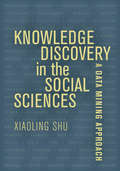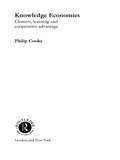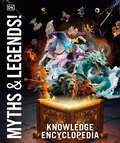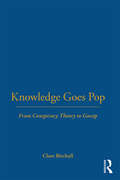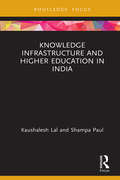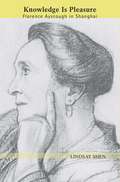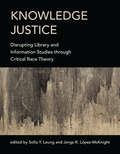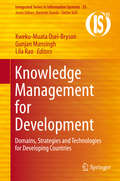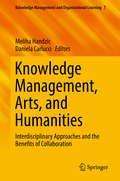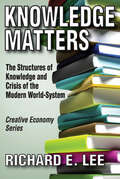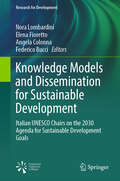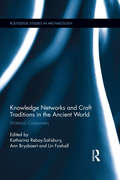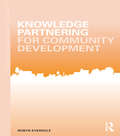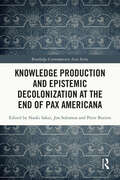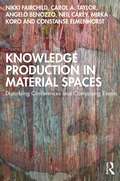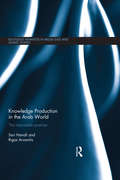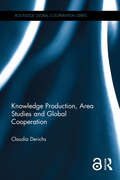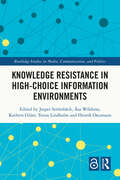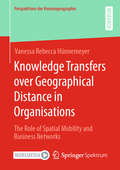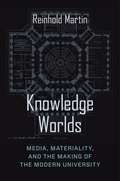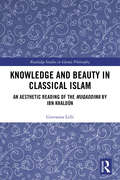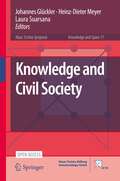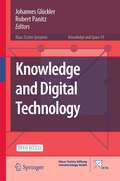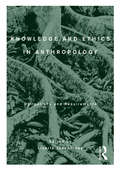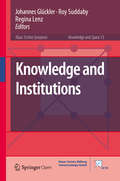- Table View
- List View
Knowledge Discovery in the Social Sciences: A Data Mining Approach
by Prof. Xiaoling ShuKnowledge Discovery in the Social Sciences helps readers find valid, meaningful, and useful information. It is written for researchers and data analysts as well as students who have no prior experience in statistics or computer science. Suitable for a variety of classes—including upper-division courses for undergraduates, introductory courses for graduate students, and courses in data management and advanced statistical methods—the book guides readers in the application of data mining techniques and illustrates the significance of newly discovered knowledge. Readers will learn to: • appreciate the role of data mining in scientific research • develop an understanding of fundamental concepts of data mining and knowledge discovery • use software to carry out data mining tasks • select and assess appropriate models to ensure findings are valid and meaningful • develop basic skills in data preparation, data mining, model selection, and validation • apply concepts with end-of-chapter exercises and review summaries
Knowledge Economies: Clusters, Learning and Cooperative Advantage (Routledge Studies in International Business and the World Economy #Vol. 26)
by Philip CookeThis book traces the theoretical explanation for clusters back to the work of classical economists and their more modern disciples, who saw economic development as a process involving serious imbalances in the exploitation of resources. Initially, natural resource endowments explained the formation of nineteenth and early twentieth-century industrial districts. Today, geographical concentrations of scientific and creative knowledge are the key resource. But these require a support system, ranging from major injections of basic research funding, to varieties of financial investment and management, tothe provision of specialist incubators, for economic value to be realised. These are also specialised forms of knowledge that contribute to a serious imbalance in the distribution of economic opportunity.
Knowledge Encyclopedia Myths and Legends
by DKDK’s best-selling illustrated encyclopedia series explores the fantastical world of myths and legends.Discover stories from myth and legend as you've never seen them before through incredibly detailed 3D illustrations in this encyclopedia for children aged 9+.Knowledge Encyclopedia’s clear explanations, illustrations, photographs, and 3D images will engage children in complex subjects. Find yourself transported to a realm of myth and legend with this perfect gift for anyone who loves stories of gods, monsters, and heroes.This all-encompassing myth encyclopedia for kids offers:An impressive collection of facts, charts, timelines, and illustrations.A visual approach using illustrations, photographs, and extremely detailed 3D CGI images.Clear explanations and retellings of different myths and legends from around the world.Children can explore mythology in a new and exciting way through spectacular computer-generated images of key heroes, gods, monsters, and locations. This new book in the Knowledge Encyclopedia series will inspire children with vivid depictions of scenes from the stories, and their retellings and explanations of the myths.Bringing tales from mythology and folklore to life, Knowledge Encyclopedia: Myths and Legends! lets children peer inside legendary buildings such as the Slavic Baba Yaga’s chicken-legged hut, and get up close to their favorite animal heroes, from China’s irrepressible Monkey King to West Africa’s spider trickster Anansi.More in the seriesKnowledge Encyclopedia Myths and Legends! is part of DK’s visual and hugely successful Knowledge Encyclopedia series. Complete the collection and dive into the deep with Knowledge Encyclopedia Ocean!, take a trip to the solar system with Knowledge Encyclopedia Space!, and travel back to prehistoric times with Knowledge Encyclopedia Dinosaur!
Knowledge Goes Pop: From Conspiracy Theory to Gossip (Culture Machine)
by Clare BirchallA voice on late night radio tells you that a fast food joint injects its food with drugs that make men impotent. A colleague asks if you think the FBI was in on 9/11. An alien abductee on the Internet claims extra-terrestrials have planted a microchip in her left buttock. 'Julia Roberts in Porn Scandal' shouts the front page of a gossip mag. A spiritual healer claims he can cure chronic fatigue syndrome with the energizing power of crystals . . . What do you believe? Knowledge Goes Pop examines the popular knowledges that saturate our everyday experience. We make this information and then it shapes the way we see the world. How valid is it when compared to official knowledge and why does such (mis)information cause so much institutional anxiety? Knowledge Goes Pop examines the range of knowledge, from conspiracy theory to plain gossip, and its role and impact in our culture.
Knowledge Infrastructure and Higher Education in India (Routledge Focus on Economics and Finance)
by Kaushalesh Lal Shampa PaulThis short book examines the availability and adoption of new education technologies in higher education institutions in India. It provides a summary of the activities in which such technologies are being used and the catalytic factors for such adoptions. The book also evaluates the impact on skill development, and will be a useful reference for those who are interested to find out more about technology adoption and implementation in higher education, and what the challenges are through the learning experiences in these education institutions.
Knowledge Is Pleasure
by Lindsay ShenFlorence Ayscough - poet, translator, Sinologist, Shanghailander, avid collector, pioneering photographer and early feminist champion of women's rights in China. Ayscough's modernist translations of the classical poets still command respect, her ethnographic studies of the lives of Chinese women still engender feminist critiques over three quarters of a century later and her collections of Chinese ceramics and 'objets' now form an important part of several American museum's Asian art collections. Raised in Shanghai in an archetypal Shanghailander family in the late nineteenth century, Ayscough was to become anything but a typical foreigner in China. Encouraged by the New England poet Amy Lowell, she was to become a much sought after translator in the early years of the new century, not least for her radical interpretations of the Tang-dynasty poet Tu Fu. She later moved on to record China and particularly Chinese women using the new technology of photography, turn the Royal Asiatic Society's Shanghai library into the best on the China Coast and build several impressive collections featuring textiles, Ming and Qing ceramics. By the time of her death Florence Ayscough has left a legacy of collection and scholarship unrivalled by any other foreign woman in China before or since. In this biography, Lindsay Shen recovers Ayscough for posterity and returns her to us as a woman of amazing intellectual vibrancy and strength.
Knowledge Justice: Disrupting Library and Information Studies through Critical Race Theory
by Sofia Y. Leung and Jorge R. López-McKnightBlack, Indigenous, and Peoples of Color--reimagine library and information science through the lens of critical race theory.In Knowledge Justice, Black, Indigenous, and Peoples of Color scholars use critical race theory (CRT) to challenge the foundational principles, values, and assumptions of Library and Information Science and Studies (LIS) in the United States. They propel CRT to center stage in LIS, to push the profession to understand and reckon with how white supremacy affects practices, services, curriculum, spaces, and policies.
Knowledge Management for Development
by Kweku-Muata Osei-Bryson Gunjan Mansingh Lila RaoA number of developing countries, including small island states have common problems that have affected their development and growth. Knowledge Management (KM) initiatives can be used to address some of these issues, but these developing countries need to understand what is needed to implement them, in order to improve economic conditions. While many of these countries have access to technologies that can be used to assist in knowledge management, relevant and low cost KM initiatives need to be considered in improving their existing KM processes. Sectors critical to the growth of these developing countries include health care, crime management, disaster recovery management, small and medium size enterprise development. Knowledge Management for Development: Domains, Strategies and Technologies for Developing Countries highlights the opportunities in these sectors and provides advice as to how these countries should go about understanding, building and adopting the relevant KM strategies and technologies. This book identifies appropriate technologies which should be considered to increase productivity within the identified sectors in the developing countries and also sectors in where knowledge management initiatives can yield maximum value. It also considers the constraints of these territories, recommending appropriate technologies and strategies for KM initiatives. It provides advice on how these technologies should be adopted in these sectors of developing countries. Investing in these strategies should benefit these countries development and growth.
Knowledge Management, Arts, and Humanities: Interdisciplinary Approaches and the Benefits of Collaboration (Knowledge Management and Organizational Learning #7)
by Meliha Handzic Daniela CarlucciThis book presents a series of studies that demonstrate the value of interactions between knowledge management with the arts and humanities. The carefully compiled chapters show, on the one hand, how traditional methods from the arts and humanities – e.g. theatrical improvisation, clay modelling, theory of aesthetics – can be used to enhance knowledge creation and evolution. On the other, the chapters discuss knowledge management models and practices such as virtual knowledge space (BA) design, social networking and knowledge sharing, data mining and knowledge discovery tools. The book also demonstrates how these practices can yield valuable benefits in terms of organizing and analyzing big arts and humanities data in a digital environment.
Knowledge Matters: The Structures of Knowledge and Crisis of the Modern World-System (Creative Economy & Innovation Culture)
by Richard E. LeeEconomic changes and political changes which emerged with the modern capitalist world-economy were accompanied in the sociocultural domain by changes in the structures of knowledge. These included the hierarchical separation of the realm of facts from that of values, institutionalized as a division between the sciences and the humanities. The social sciences responded to contradictions inherent in this structure over the nineteenth century in producing knowledge on which policy decisions could be based. The problems of the contemporary period indicate we are in a long-term, structural crisis. Nowhere is this more apparent than in the theoretical frameworks and methodological approaches through which social analysts and observers alike seek to understand the world. Since the 1960s, developments in the field of knowledge, especially two movements complexity studies in the natural sciences and cultural studies in the humanities have contested the naturalized, essentialist boundaries separating the sciences, the social sciences and the humanities. The primary rationale for this work is to recognize the inseparable whole composed of the material structures of the world and the structures of knowledge that govern what actions may be deemed legitimate and effective. 'Knowledge Matters' discusses what actions will actually be undertaken by social agents, and what such an approach means for an analysis of the present situation in terms of imagining and evaluating possible futures.
Knowledge Models and Dissemination for Sustainable Development: Italian UNESCO Chairs on the 2030 Agenda for Sustainable Development Goals (Research for Development)
by Nora Lombardini Elena Fioretto Angela Colonna Federico BucciThis book delves into the invaluable contributions made by the Italian UNESCO Chairs toward addressing the intricate and pressing global challenges of our era. Established within the UNITWIN/UNESCO Chairs program initiated by UNESCO in 1992, these Chairs serve as vital links between the realms of academic research and civil society. They offer a conduit for disseminating knowledge, thereby advancing the objectives of global development. By facilitating the transfer and adoption of scientific methodologies through intellectual collaboration, they strive to enhance the sustainability and resilience of both individual communities and society at large. Through a series of dialogues, the Italian UNESCO Chairs critically examine the challenges inherent in this mission, the objectives they aim to achieve, the strategies employed in scientific research, and the development of novel areas of study. They approach these endeavors with a conscientious and responsible mindset, recognizing them as essential responses to the multifaceted issues arising in our rapidly evolving world. The contributions put forth by the Italian UNESCO Chairs serve as practical tools for the implementation of the 17 Sustainable Development Goals, making them relevant to various stakeholders. These include not only citizens, scholars, public and private institutions, research centers, and administrators but also anyone with an interest in tackling the challenges of sustainable development in our everyday lives.
Knowledge Networks and Craft Traditions in the Ancient World: Material Crossovers (Routledge Studies in Archaeology)
by Lin Foxhall Katharina Rebay-Salisbury Ann BrysbaertThis edited volume investigates knowledge networks based on materials and associated technologies in Prehistoric Europe and the Classical Mediterranean. It emphasises the significance of material objects to the construction, maintenance, and collapse of networks of various forms – which are central to explanations of cultural contact and change. Focusing on the materiality of objects and on the way in which materials are used adds a multidimensional quality to networks. The properties, functions, and styles of different materials are intrinsically linked to the way in which knowledge flows and technologies are transmitted. Transmission of technologies from one craft to another is one of the main drivers of innovation, whilst sharing knowledge is enabled and limited by the extent of associated social networks in place. Archaeological research has often been limited to studying objects made of one particular material in depth, be it lithic materials, ceramics, textiles, glass, metal, wood or others. The knowledge flow and transfer between crafts that deal with different materials have often been overlooked. This book takes a fresh approach to the reconstruction of knowledge networks by integrating two or more craft traditions in each of its chapters. The authors, well-known experts and early career researchers, provide concise case studies that cover a wide range of materials. The scope of the book extends from networks of craft traditions to implications for society in a wider sense: materials, objects, and the technologies used to make and distribute them are interwoven with social meaning. People make objects, but objects make people – the materiality of objects shapes our understanding of the world and our place within it. In this book, objects are treated as clues to social networks of different sorts that can be contrasted and compared, both spatially and diachronically.
Knowledge Partnering for Community Development (Community Development Research and Practice Series)
by Robyn EversoleEffective community development means that many different stakeholders have to work together: governments, development organizations and NGOs, and most importantly, the people they serve. Knowledge Partnering for Community Development teaches community development professionals how to mediate community needs and development agendas to make community-based solutions for development challenges. Based on the newest research in community and global development, Eversole shows readers a strong research and theoretically based framework for understanding local development processes, and gives them the skills to turn this into cutting-edge practice. Each chapter features global case studies of innovative community-state partnerships, and practical application exercises and strategies for professionals looking to bring new approaches to their research. Knowledge Partnering for Community Development is essential for community workers and students of community development looking to bridge the gap between research insight and best practice between community actors.
Knowledge Production and Epistemic Decolonization at the End of Pax Americana (Routledge Contemporary Asia Series)
by Jon Solomon Naoki Sakai Peter ButtonThis book critically analyzes the global hegemony of the United States – a hegemony whose innovative aspect consists in articulating postcoloniality to imperial control – in relation to knowledge and knowledge production. Through targeted case studies on the historical relationship between regional areas and the United States, the authors explore possibilities and obstacles to epistemic decolonization. By highlighting the connection between the control of work and the control of communication that has been at the core of the colonial regimes of accumulation (‘classic colonialism’), they present an entirely new form of disciplinary practice, not based on the equation of evolution and knowledge. An extensive introduction outlines the historical genealogy of Pax Americana epistemic hegemony, while individual chapters examine the implications for different regions of the world and different domains of activity, including visual culture, economy, migration, the arts, and translation. This interdisciplinary collection will appeal to students and scholars in many fields, including Asian studies, American studies, postcolonialism, and political theory.
Knowledge Production in Material Spaces: Disturbing Conferences and Composing Events
by Neil Carey Carol A. Taylor Nikki Fairchild Angelo Benozzo Mirka Koro Constanse ElmenhorstKnowledge Production in Material Spaces is a curation of the interventions that the authors undertook at a range of academic conferences since 2016. It problematizes disciplined practices and expectations governing academic conference spaces and generates new ways of thinking and doing conferences otherwise. The authors use posthuman, feminist materialist and post-qualitative theories to disrupt knowledge production in neoliberal and bureaucratic conferences spaces. The analysis they offer, and the rhizomatic writing and presentational styles they use, promote a form of educational activism through theory. They interrogate the conference space as a regulated, normalized and standardized mode of academic knowledge production – which they call the ‘AcademicConferenceMachine’ – and playfully subvert the dominant meanings and modes of conferences and workshops to show how we can better interact and produce research, with and for each other. The authors indicate how creative conference practices promote playful possibilities to imagine and produce knowledge differently. This book will appeal to audiences ranging from established professionals to early career scholars, doctoral and master’s students in Education and the social sciences.
Knowledge Production in the Arab World: The Impossible Promise (Routledge Advances in Middle East and Islamic Studies)
by Sari Hanafi Rigas ArvanitisOver recent decades we have witnessed the globalization of research. However, this has yet to translate into a worldwide scientific network, across which competencies and resources can flow freely. Arab countries have strived to join this globalized world and become a ‘knowledge economy,’ yet little time has been invested in the region’s fragmented scientific institutions; institutions that should provide opportunities for individuals to step out on the global stage. Knowledge Production in the Arab World investigates research practices in the Arab world, using multiple case studies from the region with particular focus on Lebanon and Jordan. It depicts the Janus-like face of Arab research, poised between the negative and the positive and faced with two potentially opposing strands; local relevance alongside its internationalization. The book critically assesses the role and dynamics of research and poses questions that are crucial to further our understanding of the very particular case of knowledge production in the Arab region. The book explores research’s relevance and whom it serves, as well as the methodological flaws behind academic rankings and the meaning and application of key concepts such as knowledge society/economy. Providing a detailed and comprehensive examination of knowledge production in the Arab world, this book is of interest to students, scholars and policy makers working on the issues of research practices and status of science in contemporary developing countries.
Knowledge Production, Area Studies and Global Cooperation (ISSN)
by Claudia DerichsWhereas Area Studies and cross-border cooperation research conventionally demarcates groups of people by geographical boundaries, individuals might in fact feel more connected by shared values and principles than by conventional spatial dimensions. Knowledge Production, Area Studies and Global Cooperation asks what norms and principles lead to the creation of knowledge about cross-border cooperation and connection. It studies why theories, methods, and concepts originate in one place rather than another, how they travel, and what position the scholar adopts while doing research, particularly ‘in the field’.Taking case studies from Asia, the Middle East and North Africa, the book links the production of alternative epistemologies to the notion of global cooperation and reassesses the ways in which the concept of connectedness can be applied at the translocal and individual rather than the formal international and collective level.Knowledge Production, Area Studies and Global Cooperation provides an innovative and critical approach towards established means of producing knowledge about different areas of the world, demonstrating that an understanding of pluri-local connectivity should be integrated into the production of knowledge about different areas of the world and the behavioural dimension of global cooperation. By shifting the view from the collective to the individual and from the formal to often invisible patterns of connectedness, this book provides an important fresh perspective which will be of interest to scholars and students of Area Studies, Politics, International Relations and Development Studies. The Open Access version of this book, available at http://www.taylorfrancis.com, has been made available under a Creative Commons Attribution-Non Commercial-No Derivatives (CC-BY-ND) 4.0 license.
Knowledge Resistance in High-Choice Information Environments (Routledge Studies in Media, Communication, and Politics)
by Jesper StrömbäckThis book offers a truly interdisciplinary exploration of our patterns of engagement with politics, news, and information in current high-choice information environments. Putting forth the notion that high-choice information environments may contribute to increasing misperceptions and knowledge resistance rather than greater public knowledge, the book offers insights into the processes that influence the supply of misinformation and factors influencing how and why people expose themselves to and process information that may support or contradict their beliefs and attitudes. A team of authors from across a range of disciplines address the phenomena of knowledge resistance and its causes and consequences at the macro- as well as the micro-level. The chapters take a philosophical look at the notion of knowledge resistance, before moving on to discuss issues such as misinformation and fake news, psychological mechanisms such as motivated reasoning in processes of selective exposure and attention, how people respond to evidence and fact-checking, the role of political partisanship, political polarization over factual beliefs, and how knowledge resistance might be counteracted. This book will have a broad appeal to scholars and students interested in knowledge resistance, primarily within philosophy, psychology, media and communication, and political science, as well as journalists and policymakers. The Open Access version of this book, available at www.taylorfrancis.com, has been made available under a Creative Commons Attribution-Non Commercial-No Derivatives 4.0 license.
Knowledge Transfers over Geographical Distance in Organisations: The Role of Spatial Mobility and Business Networks (Perspektiven der Humangeographie)
by Vanessa Rebecca HünnemeyerCurrent corporate structures based on internationalisation and decentralisation are opposed to the nature of the most important resource: knowledge. The acquisition and exchange of (tacit) knowledge relies on interpersonal interactions and is thus time- and place-dependent. Given that the combination of heterogeneous knowledge stocks furthers innovation, organisations develop strategies to ensure the transfer of knowledge. To enable intra-organisational knowledge flows spatial mobility at the workplace affects a wide range of employees. The study examines in which ways spatially mobile employees, i.e. expatriates, contribute to those knowledge flows. The study of ego networks reveals not only social dynamics of knowledge transfer, but the geographical framework allows to discuss knowledge flows from a spatial perspective. On the one hand, the empirical results confirm their knowledge transfer function. On the other hand, the relational geographical perspective reveals that expatriates do not represent a homogeneous group, but their roles in the knowledge transfer process, the geographical reach of their networks and their knowledge resources depend on job-, knowledge-, individual- and space-related factors.
Knowledge Worlds: Media, Materiality, and the Making of the Modern University
by Reinhold MartinWhat do the technical practices, procedures, and systems that have shaped institutions of higher learning in the United States, from the Ivy League and women’s colleges to historically black colleges and land-grant universities, teach us about the production and distribution of knowledge? Addressing media theory, architectural history, and the history of academia, Knowledge Worlds reconceives the university as a media complex comprising a network of infrastructures and operations through which knowledge is made, conveyed, and withheld.Reinhold Martin argues that the material infrastructures of the modern university—the architecture of academic buildings, the configuration of seminar tables, the organization of campus plans—reveal the ways in which knowledge is created and reproduced in different kinds of institutions. He reconstructs changes in aesthetic strategies, pedagogical techniques, and political economy to show how the boundaries that govern higher education have shifted over the past two centuries. From colleges chartered as rights-bearing corporations to research universities conceived as knowledge factories, educating some has always depended upon excluding others. Knowledge Worlds shows how the division of intellectual labor was redrawn as new students entered, expertise circulated, science repurposed old myths, and humanists cultivated new forms of social and intellectual capital. Combining histories of architecture, technology, knowledge, and institutions into a critical media history, Martin traces the uneven movement in the academy from liberal to neoliberal reason.
Knowledge and Beauty in Classical Islam: An Aesthetic Reading of the Muqaddima by Ibn Khaldūn (Routledge Studies in Islamic Philosophy)
by Giovanna LelliThis volume offers an aesthetic reading of the Muqaddima by Ibn Khaldūn (d. 1406), a text that has been studied up to the present as a work on historiography. It argues that the Muqaddima is also a comprehensive treatise on classical Arab-Islamic culture and provides a picture of classical Arab-Islamic aesthetics in its totality. The theme of the book is the intrinsic connection between beauty and knowledge in the Muqaddima. Whenever Ibn Khaldūn deals with the problem of knowledge and science, he also deals with the problem of sensual beauty as an instrument or an obstacle to attain it. Ibn Khaldūn’s philosophy of history is necessarily also an aesthetics of history. His key-notion of “group feeling”, the physical, ethic and aesthetic virtue of Bedouin societies, is at once the origin of the ascent of centralised States and the cause of their ruin. It represents a tragic contradiction that applies to the history of the Maghreb but then takes a universal value. It reflects a range of other contradictions inherent to the "system" of classical Arab-Islamic aesthetics. These contradictions undermine the aesthetic system of the Muqaddima from within and provide decisive elements for the emergence of modern aesthetics. Offering a comparative approach, the volume is a key resource to scholars and students interested in Arabic and Islamic studies, philosophy, aesthetics and global history.
Knowledge and Civil Society (Knowledge and Space #17)
by Johannes Glückler Laura Suarsana Heinz-Dieter MeyerThis open access book focuses on the role of civil society in the creation, dissemination, and interpretation of knowledge in geographical contexts. It offers original, interdisciplinary and counterintuitive perspectives on civil society. The book includes reflections on civil and uncivil society, the role of civil society as a change agent, and on civil society perspectives of undone science. Conceptual approaches go beyond the tripartite division of public, private and civic sectors to propose new frameworks of civic networks and philanthropic fields, which take an inclusive view of the connectivity of civic agency across sectors. This includes relational analyses of epistemic power in civic knowledge networks as well as of regional giving and philanthropy. The original empirical case studies examine traditional forms of civic engagement, such as the German landwomen’s associations, as well as novel types of organizations, such as giving circles and time banks in their geographical context. The book also offers insider reflections on doing civil society, such as the cases of the Umbrella Movement in Hong Kong, epistemic activism in the United States, and the #FeesMustFall movement in South Africa.
Knowledge and Digital Technology (Knowledge and Space #19)
by Johannes Glückler Robert PanitzThis open access book explores the multifaceted interplay of technology, knowledge, and place. While digital technology is increasingly influencing our way of knowing, conversely it is itself the consequence of human creativity and local social interaction. Part I analyzes how digital technologies transform markets through artificial intelligence and decentralized blockchain models. Its contributions discuss novel governance mechanisms, including the responsible use and analysis of big data. Part II illustrates various ways in which technology supports humanity, be it algorithms supporting complex decision-making processes or the use of robotics in care services. The chapters highlight that technology's efficiency and potential rely on social norms and human capital. Finally, Part III shows that digitization is generating vibrant entrepreneurship, reflected in geographically clustered urban scale-up economies, as well as opening up new ways for people to connect with one another, organize civic engagement and enable new forms of labor. The book offers theoretical reflections as well as empirical cases from the United States, Canada, Japan, South Africa, and Europe. This volume provides a valuable read for scholars, students and professionals in the fields of knowledge creation, technology and governance.
Knowledge and Ethics in Anthropology: Obligations and Requirements (Criminal Practice Ser. #31)
by Lisette JosephidesInspired by the work of world-renowned anthropologist Marilyn Strathern, this collection of essays features contributions from a range of internationally recognized scholars – including Strathern herself – which examine a range of methodologies and approaches to the anthropology of knowledge.The book investigates the production of knowledge through a variety of themes, centered on the question of the researcher’s obligations and the requirements of knowledge. These range from the obligation to connect with local culture and existing anthropological knowledge, to the need to draw conclusions and circulate what has been learned. Taking up themes that are relevant for anthropology as a whole – particularly the topic of knowledge and the ethics of knowing others, as well as the notion of the local in a global world – Knowledge and Ethics in Anthropology is key reading for students and scholars alike. A thorough introduction to the key concepts and terms used in Strathern’s work is provided, making this a fantastic resource for anyone encountering her work for the first time.
Knowledge and Institutions (Knowledge and Space #13)
by Roy Suddaby Johannes Glückler Regina LenzThis open access book bridges the disciplinary boundaries within the social sciences to explore the role of social institutions in shaping geographical contexts, and in creating new knowledge. It includes theorizations as well as original empirical case studies on the emergence, maintenance and change of institutions as well as on their constraining and enabling effects on innovation, entrepreneurship, art and cultural heritage, often at regional scales across Europe and North America. Rooted in the disciplines of management and organization studies, sociology, geography, political science, and economics the contributors all take comprehensive approaches to carve out the specific contextuality of institutions as well as their impact on societal outcomes. Not only does this book offer detailed insights into current debates in institutional theory, it also provides background for scholars, students, and professionals at the intersection between regional development, policy-making, and regulation.
